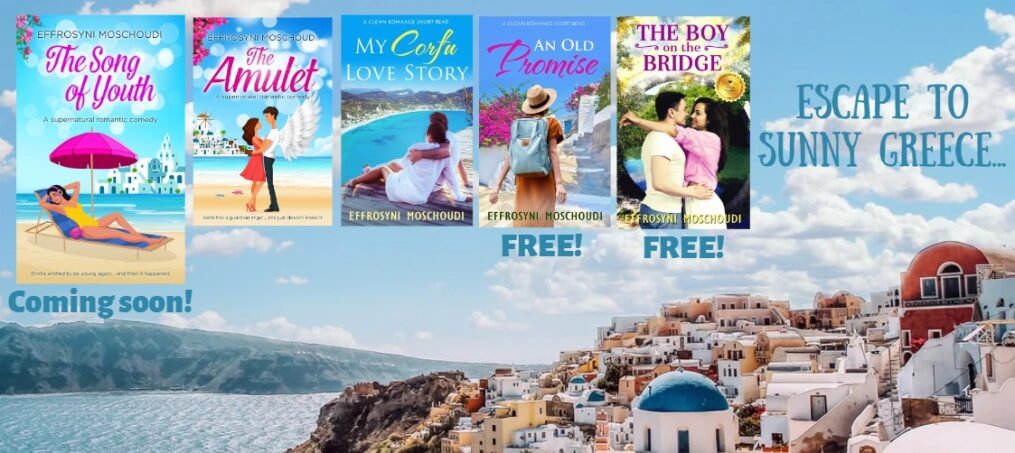Today I’m pleased to present a different kind of author and book: Yannis Nikolakopoulos is a Greek from Australia. He writes delightful children’s books that teach the young ones Greek the fun way, while delving into the Greek culture as well. Here’s a fine sample:
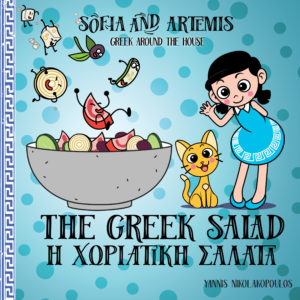
Today is Sofia’s nameday and her cousins are coming to visit. She has to prepare a salad, but all the ingredients are busy in the Olympic games! Can she and Artmeis her cat make the salad in time?” The Greek Salad is an adventure in the kitchen that teaches kids their first Greek words using fun stories, characters and games. By placing the included stickers in your kitchen, you can continue the lesson and effortlessly integrate Greek into your child’s life. Written inline in English, Greek and Greeklish, no knowledge of Greek is needed for a parent to read the story in Greek to their children, and as the child grows into being able to read themselves, they can also discover the language without prior knowledge of the Greek alphabet.
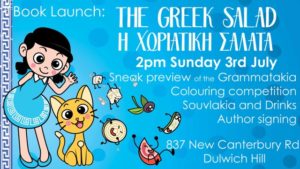
Hello Yannis and welcome to my blog!
Hi, Fros! Great to be here!
What has inspired you to write The Greek Salad ?
A very strong cup of coffee in 2009 is to blame. It was like a lightning bolt of inspiration and I had an entire series of stories and characters in my mind that would bring Greek history, philosophy, culture, and most importantly, language into children’s lives. Since then I have fleshed out the characters, scoured the world for the perfect illustrators to bring them to life, and drafted over 40 children’s book stories, each of which is a micro-lesson in some aspect of Greek culture. The Greek salad is the first book for the youngest kids; it is designed to familiarize them with a few basic words, and to turn the act of making a salad into a fun game.
What was the first thing you ever wrote and how old were you then?
When I was 6 years old I wrote a story about the giants hiding in volcanoes and how they had to control their anger so as not to destroy the villages with lava, and a little boy who could whisper to the volcanoes and calm them down.
Oh, sounds wonderful! What other writing have you done? Anything else published?
Most of my writing is newspaper articles from the early 2000’s and since then I have been running my own film production company in which I have produced hundreds of short to medium length documentaries. I have also written and directed several short films and satirical videos online that have gone viral, most notably “Quiet signs of love”, a short romantic film for the deaf community that won awards globally with millions of views.
How impressive, well done! What are you working on at the moment? Tell us a little about your current project(s).
I am busy with the next two books in the Grammatakia series.
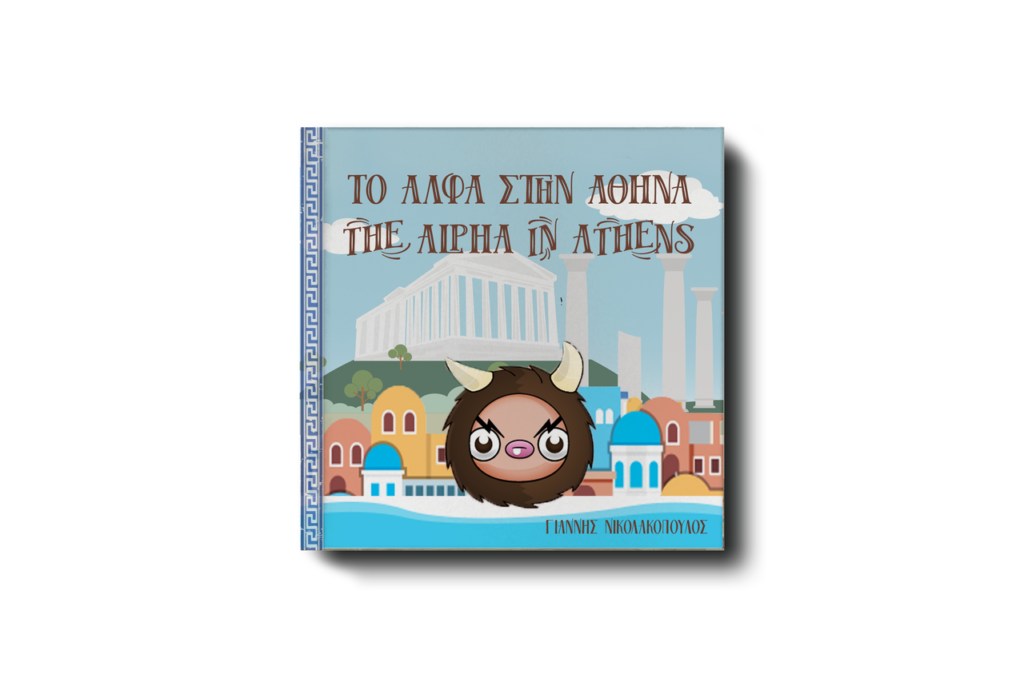
Firstly, The Alpha goes to Athens, which follows the adventures of Alpha as he travels through Athens searching for the rest of the Grammatakia, cute pokemon-style characters in the shape of the Greek alphabet, and blends it with a quasi guide book for tourist kids.
And secondly, Pappou’s Pappou’s Pappou where Sofia asks her pappou who his pappou was and who his pappou’s pappou’s pappou was etc. right back to ancient Greece. So that book is actually an outline of Greek history for kids.
Do you have any advice for other indie authors?
I think I probably need as much advice as I can give, but my perspective boils down to one thing: Audience is everything. The only thing that gave the old paradigm of publishers legitimacy is access to an audience through bookstores and similar networks. It was a passive crowd that browsed stores for generally interesting new material. Today’s crowd is active. They specifically search for a particular interest, so the power of the indie author is that, unlike the older publishing model, MUST specifically target a niche need of a niche audience and find ways for active seekers of that niche to find them, and then be able to win their loyalty and trust in delivering to that need.
The need itself is paradoxical, to be familiar but to feel new, and fresh.
The writing needs to tap into the shared space of a common belief or desire, whether that is cultural, historical or the promise that a genre holds to deliver a specific emotional experience. But on top of that shared common knowledge, it needs to innovate and deliver a fresh experience.
Yes, it’s important to find a small niche and, as you said, to deliver a fresh experience…
That’s right . . . Our writing must build on what we know and allow the audience to feel their emotions in a fresh way. That is more important than being original, to make what we experience over and over as people to feel new.
Indeed. Are there any sites or writing tools that you find useful and wish to recommend?
You can often find me typing furiously into my phone at any point of the day, trying to capture the lightning bolts of inspiration. For this I use Evernote, although any note software would work. Sometimes, if the idea comes too fast, I use the Voice recorder app, and can capture the nuances of a character’s accent or attitude as I play it out.
When I sit and write and untangle the moments of inspiration into an ordered script, I can only use Scrivener. Its snapshot feature is a savior as it allows me to destroy earlier drafts with confidence.
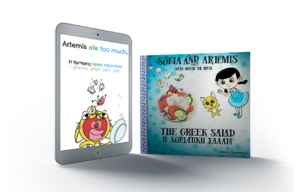
To make a children’s book, as with my other writing, I end up creating a universe of characters and stories to fit it into, and if this becomes difficult I use a piece of software called Aeon Timeline. It maps out all the characters and events in a story on a timeline and allows an overview of multiple complex character interactions. It’s extremely useful, and integrates nicely in to Scrivener; although paradoxically I like to manually transfer to Scrivener and use that process as a review.
What do you enjoy the most as an indie author that you imagine you wouldn’t if you were traditionally published? If you had a choice would you still go indie?
The more distance I get from traditional publishing the more clearly I see it in the rear view mirror and indie is the only way to go. As a filmmaker, my projects were judged even more harshly by how large an audience and therefore money they could attract.
But most people do not want to make bland stories to suit a vague and disconnected broad audience that wants inoffensive writing. The indie author creates a hard core group of fans deeply connected to the subject, and the author can write much more to that passion, and deliver something of much greater value and intensity, and make it economically viable also.
Indie is the only way to go! (*gives a thumbs up*)
I may be partial, but I agree! (*laughs*) Being an author involves a lot of sitting around. What do you do for exercise?
My exercise of choice is Bikram Yogam in a room heated to 40 degrees Celsius. It’s meditation, stretching and a sauna. It is not for everyone but the value of three things rolled into one leaves more time to sit in a café, writing.
Haven’t heard that one before. Interesting. If you could have one superpower what would it be?
To sit up all night writing instead of sleeping.
What has been the most important lesson you’ve learned so far in life the hard way?
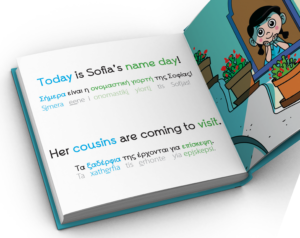
Start with marketing. Marketing is seen as tasteless and tacky self promotion by many creatives, and people don’t know how to do it. I specifically prioritized my Grammatakia series of books because marketing the books is not about self-promotion. The books have a real impact on people’s lives. So for me, marketing begins with what stories I can tell around the book that will honestly have a positive benefit to the reader’s life. Now that the books are selling, I am getting great feedback. I just received a video of a Filipino dad reading in Greek to his half-Greek daughter. And that means the world to me. Marketing means more than shameless promotion; it requires deep thinking so that the story AROUND the book (and before the book even begins to be written) delivers something special, unique and positive. I have abandoned hundreds of book and film ideas because, while I love them, they don’t deliver to an audience that is more assertive, demanding and knows what they want.
What are the things in your life that you’re most grateful for?
My wife and children.

Oh, and what a wonderful family it is!
Thank you. This is my wife with the real Sofia (7), Artemis (5) and our dog, Nala (5 months)
Thank you so much for sharing this, and for your time today. It’s been a pleasure.
The pleasure’s mine, Fros. Many thanks for introducing my work to your readers.

Yannis Nikolakopoulos is a writer, social researcher and filmmaker who has won awards for his short stories and films internationally, including a Webby Award. He has written for newspaper and journals, and his research documentary work has taken him deep into the lives of hundreds of people. His latest venture is to create a series of children’s books that open the rich tapestry of Greek history, philosophy, culture and language to make it attractive and exciting for kids of all backgrounds.
Website: www.grammatakia.com
Book presentation: https://vimeo.com/160914739
Purchase link: http://www.grammatakia.com/product/the-greek-salad/
Facebook: https://www.facebook.com/sofiaandthegrammatakia/
Twitter: https://twitter.com/SofiaGrammataki

Do you love Greece? Check out our guide to Corfu on this site! For delicious Greek recipes, head over to Effrosyni’s Blog. Sign up to Effrosyni’s newsletter for her news and special offers (very sparse emails).
